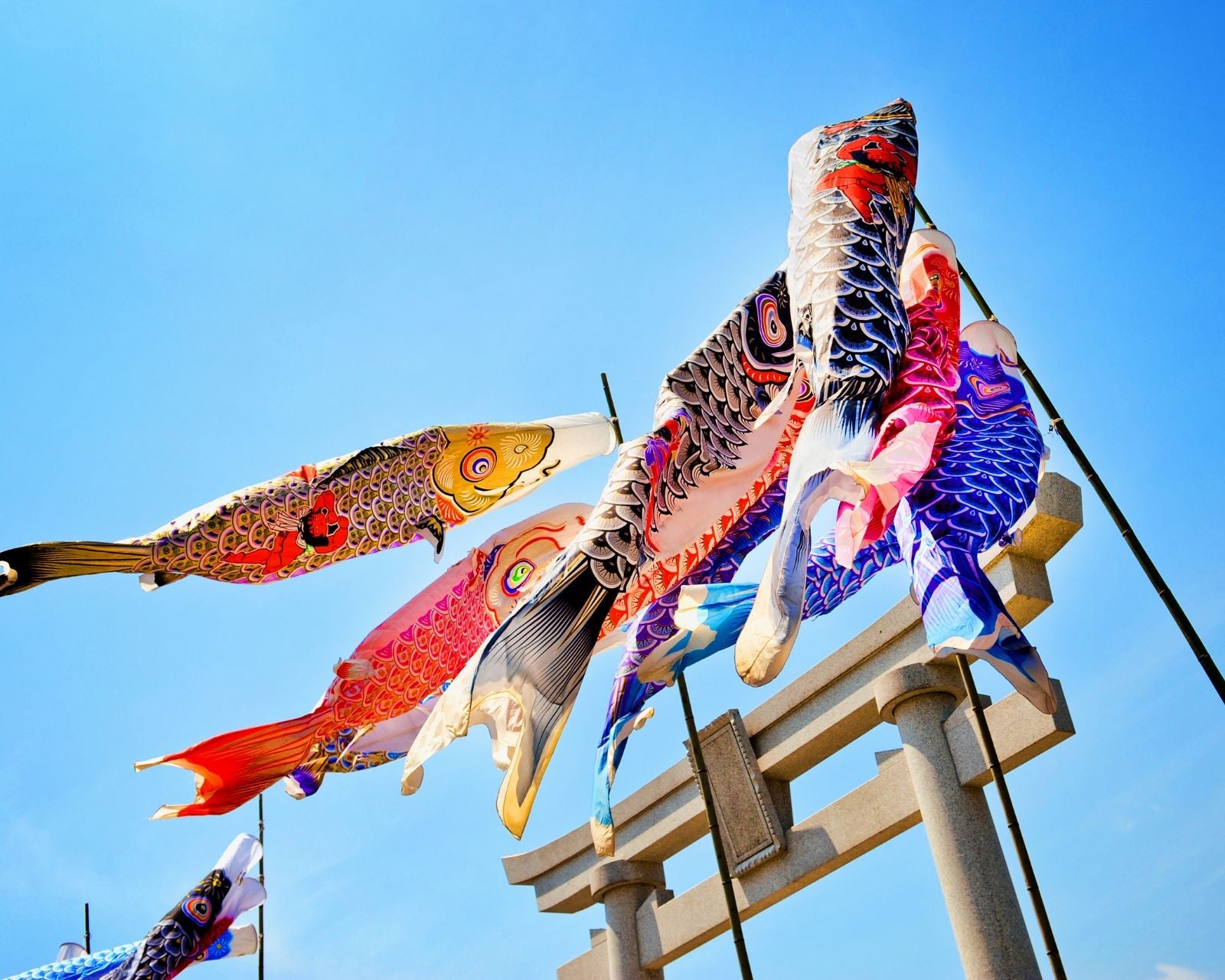In the vibrant richness of Japanese culture, koinobori (carp-shaped flags) represent one of the most significant traditional symbols. Present during Children's Day (Kodomo no Hi), celebrated annually on May 5, Japanese carp flags are not mere decorations, but convey deep values of courage, perseverance, and strong family ties in Japanese society.
Quick summary
What is koinobori? Origin of koinobori (carp-shaped flag)
In Japanese, koinobori means "carp-shaped flag," hoisted outdoors to flutter in the wind. This tradition originates from a Chinese legend in which a carp crossed the Dragon Gate waterfall and transformed into a dragon—a symbol of bravery and overcoming obstacles.
During the Edo period (1603–1868), traditional carp flags were used by samurai families to wish strength and success to their sons. Later, the Tango no Sekku festival evolved into the Carp Flag Festival and the Children's Festival, now open to all children, both girls and boys.

Characteristics of Koinobori Carp Flags
Carp Flag Colors
Each family typically hangs a set of koinobori representing each member: the large black carp for the father, the red one for the mother, and smaller ones of different colors for the children. These bright, contrasting colors make Japanese carp flags iconic visual elements of spring.
Koinobori Materials
Traditionally, koinobori were made of silk, cotton, or nylon. Today, water-resistant synthetic fabrics and digital prints ensure superior durability for extended outdoor exposure.
Shape and structure of koinobori
Traditional carp flags are long and tapered, like a windsock, with a wide mouth opening that allows them to flap in the wind like a real carp swimming against the current. The designs, fins, and colors are intricately painted or printed.

Characteristics of Koinobori Carp Flags
Detailed guide to making a koinobori carp flag
It is entirely possible to make your own koinobori (carp flag) at home, as an artistic or educational activity around Japanese culture.
Necessary equipment
- White drawing paper or A3 paper (preferably non-glossy)
- Printed carp model (or hand-drawn drawing)
- Felt-tip pens, paint or colored pencils
- White wax crayon
- Water sprayer
- Glue or glue stick
- Strip of stiff cardboard (3–5 cm to reinforce the mouth)
- Scissors, painter's tape
- Ribbon or string for hanging
- Hole punch (optional)
Manufacturing steps
Step 1: Draw or print a carp template
If you have a printer, print a double-sided carp template on A3 paper. Otherwise, draw a simple carp, 30–40 cm long, with a rounded mouth and a tapered tail.

Step 2: Fix and decorate
Secure the paper to the table with painter's tape. Use the white crayon to draw the scales, fins, and eyes, then apply the colors with markers or paint to create rich designs.
Step 3: Create a watercolor effect
Spray water gently to blend the colors and create a wash effect. Allow to dry completely.
Step 4: Strengthen the mouth
Turn the drawing over and glue the strip of cardboard along the mouth to keep it open.
Step 5: Form the body of the carp
Fold the carp lengthwise without marking the crease. Glue the top edges, tail, and top of the mouth to form a tube. The mouth opening should remain clear.

Form the body of the carp
Step 6: Add the ribbon for hanging
Drill two holes near the mouth, thread the ribbon through them, and tie. Hang your carp on the balcony, a window, or in the garden.

Add the ribbon for hanging
Conclusion
Koinobori (carp-shaped flags) are not just decorative elements of the Koinobori Festival or Carp Flag Festival , but embody deep human values and Eastern philosophy around effort, perseverance and family ties. Whether you are a tourist, a Japanese culture enthusiast or simply want to create a traditional koinobori , this activity will open a fascinating window into the richness of Japanese heritage.




